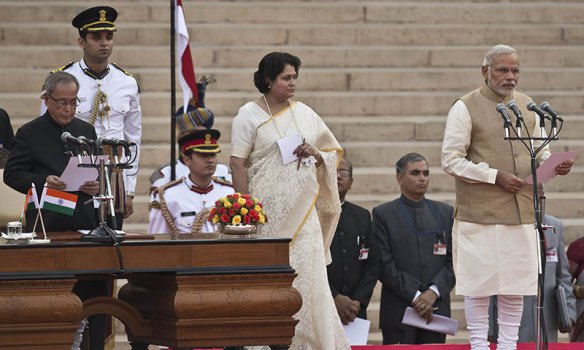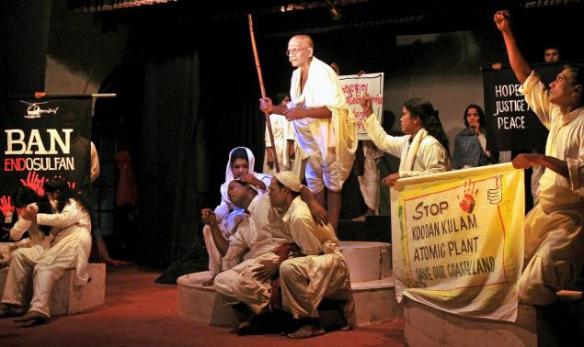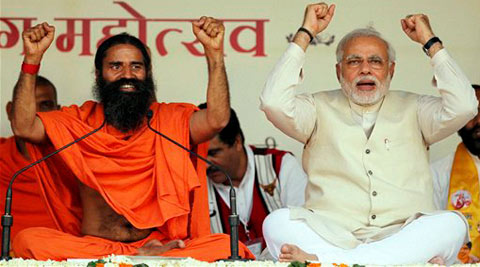The Hindu nationalist political party, BJP has taken over the reins of government in India. Though they were in power twice before, this time they have a good majority of their own, and need not depend on non Hindutva parties for support.

Today the brand ambassador of Hindutva is Narendra Modi, the new Prime minister of India. He comes from Gujarat, from a place near the birth place of Mahatma Gandhi. Is it surprising that muscular and intolerant Hindutva’s strength is coming from land of apostle of non-violence, Gandhi? Not at all. Many facets of Hindutva are closely related to ideas of Gandhi. Hindutva also derives it strength from western and Indian post modernist ideas and post colonial philosophies. Though this electoral victory is recent, the hegemony of ideas of Hindutva on Indian social and cultural milieu is present for last 2 decades and was greatly strengthened by Gandhians and post modernist Leftists.
A strong proponent of the above thesis is the scholar Meera Nanda, and this post is inspired by reading her.
Gandhism and Hindutva

Vision of Gandhi and that of Hindutva are similar in many areas.
See what Meera Nanda writes:
There is no doubt at all that Gandhi himself had no sympathy for the vicious anti-Muslim and anti-Christian sentiments that mark the muscular nationalism of Hindu nationalists. Hindu nationalists themselves recognize this difference, declaring Gandhi to be “too saintly” to fully comprehend the “evil” of Islam (Agarwal 1999).
But when it comes to the larger vision of a good society, the Hindu right wing’s relation to Gandhian philosophy is far from opportunistic. Indeed, the official philosophy of the Bharatiya Janata Party, the “integral humanism” of Deendayal Upadhyaya, is almost an exact paraphrase of Gandhi’s vision of a future India. Both seek a distinctive path for India, both reject the materialism of socialism and capitalism alike, both reject the individualism of modern society in favor of a holistic, varna-dharma based community, both insist upon an infusion of religious and moral values in politics, and both seek a culturally authentic mode of modernization that preserves Hindu values (see Fox 1987).
Gandhi was opposed to untouchability, but was not opposed to caste system per se. Modern day RSS takes the same view. Both Gandhi and RSS give importance to celibacy. Our new Prime minister, who left his wife for Hindutva work within weeks of his marriage, is an example of Hindu patriarchal thinking that women/sexual desires are an obstacle to performing useful work in society.
So it is not at all surprising that the Hindutva leader Modi is coming from near Gandhi’s home town.
Post modernism, Post Colonialism and Hindutva
It is difficult to define post modernism because it means different things to different people. Still it can be summarized as a philosophy which does not believe in single logical objective reasonable truth, but multiple subjective truths.
Post colonialism is a philosophy which tries to highlight and reinvent colonized people’s culture and portray it as opposite, equal or superior to Western culture.
Both did not believe in universal and culturally progressive nature of science. For a post modernist, science is just one of the several ways of attaining knowledge.
Thus a post colonial post modernist vision of India meant a new, non western model of development for India. They believed ‘western’ ideas like Capitalism, socialism, secularism, scientific temper, universality of scientific truth are not applicable in India. Main proponents of such a post modernist discourse included intellectuals like Ashish Nandy, Vandana Siva and Rajini Kothari. The Gandhian post modernists joined hands with ecological Marxists to fight against Nehruvian scientific temper.
Meera Nanda writes:
The critics accused the Nehruvian promoters of science of disrespecting and insulting the ordinary citizens by daring to suggest that they need to revise their ways of knowing. True equality demands that ordinary people should have as much right to question science from their perspective. The most common example cited was that of astrology. Inspired by Feyerabend, the self-proclaimed defenders of the common man argued that astrology was the myth of the weak, as much as science was the myth of the strong. Scientists and those who dare criticize astrology as a superstition must take the empirical experience of the ordinary people as evidence, and rethink their opposition to it. Astrology stood for local knowledge in general.

This strengthened the hands of Hindutva forces as they were saying the same thing. Legitimacy was given to local, not scientifically tested “knowledge”. Foolish utterances of babas and swamis should be considered seriously as they form the local knowledge, which cannot be tested or known to modern science. No local inhuman customs, especially that of minorities and tribals (weaker sections) could be criticized as Universal human rights are a Western colonial concept. Science they said was a neo-colonial tool of multinational Corporations to continue control of colonies. It rapes the holy motherland and creates natural disasters.
Thus this anti-science movement saw a strange collaboration between Gandhians, Hindutva forces and some Leftists. Such an attack on science and secular liberal thoughts resulted in Indian society losing many of the progressive gains of the 50s and 60s. Identity politics based on caste, religion, language etc gained legitimacy. Superstitions became fashionable and spurious and dangerous remedies became popular in the field of health. Unscientific health care systems like Naturopathy, Ayurveda, Unani, Sidha and Homeopathy flourished under State patronage. Anti vaccine movement gained momentum. Freedom of expression suffered as the list of holy cows that cannot be criticized increased enormously.
In short, Gandhians and post modernist Leftists have played an important role in elevating Hindutva forces to power in India.
A successful fight against Hindutva or any other communal forces needs a reaffirming of our faith in scientific method, as the only way to attain knowledge. We need to propagate scientific temper in our society. Democracy and Secularism are universal concepts essential for well being of human beings all over the world. Traditions, like anything else should be rigorously questioned. Instead of sitting on the fence, rational criticism of religion and religious superstitions/ common sense should come from science movements.
Secular polity should not accept religion/traditions as another method to attain knowledge. Whether it is minority or majority religion, hurt sentiments should never be accepted to absolve criticism. Caste based groups, even of the lowest caste, represents a regressive grouping and should not be encouraged.
A liberal humanist India is possible only with more science and less religion.
